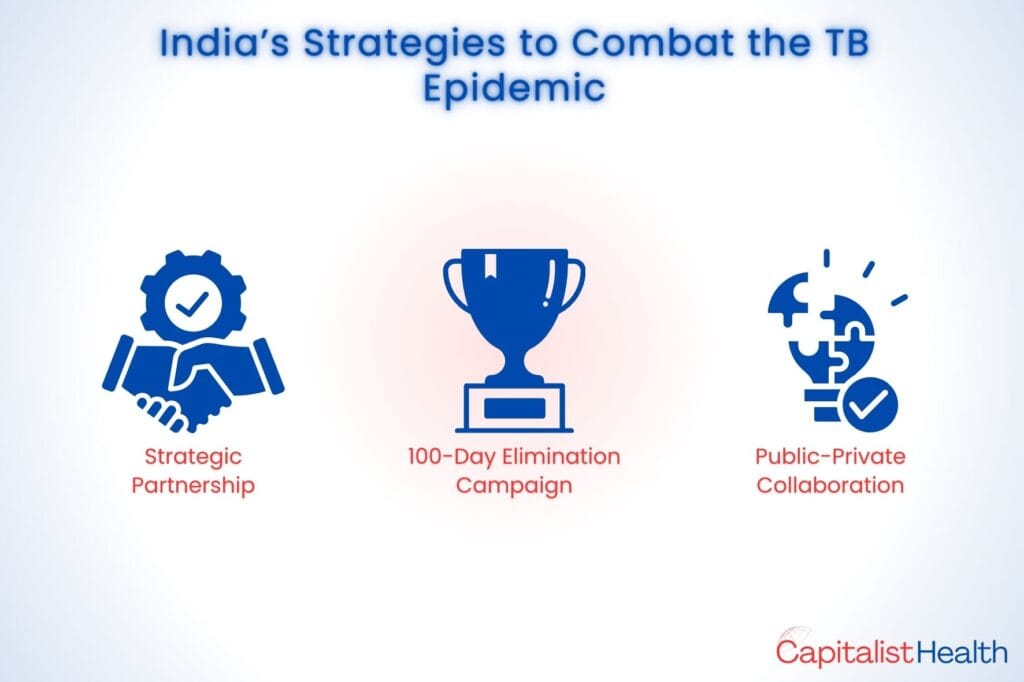Tuberculosis (TB) is more than just a disease, it’s a relentless epidemic that continues to devastate lives, particularly in India. Each year, over 10 million people are affected globally, and nearly 1.3 million lose their lives. Shockingly, India accounts for 27% of all global TB cases, making it the country with the highest TB burden in the world.
Despite the availability of effective treatments, the number of new infections has been on the rise since 2021, underscoring a dire reality that many remain unaware of. Without timely treatment, Tuberculosis (TB) can be fatal; however, with the right antibiotics as recommended by the World Health Organization (WHO), patients have an 85% chance of being cured. Sadly, systemic failures and societal stigma overshadow this potential for recovery.
- Less known but Harsh Reality of Tuberculosis (TB) in India
- What is the Emotional and Social Toll?
- What Underlying Factors Have Sustained the Tuberculosis (TB) Crisis in India?
- The Urgency of Accurate and Early Diagnosis
- Global Health and Policy Breakdown
- India’s Strategies to Combat the TB Epidemic
- Let us Spark A Collaborative Fight for a Curable Disease
Less known but Harsh Reality of Tuberculosis (TB) in India

Tuberculosis (TB) poses a severe health crisis in India, resulting in around 220,000 fatalities each year. The impact extends beyond health, plunging affected families into deeper poverty as they struggle with the financial burden of the disease. This burden manifests as:
- Direct Medical Costs: Hospitalization, testing, and medications can financially cripple low-income families.
- Indirect Costs: Loss of work and caregiving responsibilities push affected families deeper into poverty.
In 2023–2024, India recorded its highest number of Tuberculosis (TB) cases ever, with a troubling trend of rising infections since 2021. Despite slight drops in incidence and mortality, the crisis remains dire. Notably, of the $2 billion funding goal for TB innovation set by the Stop TB Partnership, only $0.9 billion was utilised, highlighting a major funding gap.
What is the Emotional and Social Toll?

Tuberculosis (TB) carries a heavy psychological burden. Stigma, shame, and isolation often prevent patients from seeking care. Many families hide TB cases out of fear of judgment, delaying diagnosis and treatment. This social stigma fuels transmission deepens mental health struggles and undermines community support. This emotional burden can deter individuals from accessing the care they need, further perpetuating the cycle of infection and suffering.
What Underlying Factors Have Sustained the Tuberculosis (TB) Crisis in India?

✅ Systemic Failures in Public Health
Attributing the high Tuberculosis (TB) incidence in India to a single factor oversimplifies a complex crisis. The rise of TB is a result of systemic failures to address the disease, including:
- Scarcity of Medications: Access to essential Tuberculosis (TB) drugs remains limited, especially in rural areas.
- Delayed Diagnosis: Inadequate training and infrastructure result in late or missed diagnoses.
- Limited Access to Care: Rural and underserved areas often lack functional clinics and diagnosis.
✅ Healthcare System Challenges
India’s healthcare system grapples with severe inadequacies, such as:
- Underfunded Infrastructure: Clinics are often unequipped to manage Tuberculosis (TB) cases.
- Fragmented Services: Disjointed efforts across private and public sectors hinder coordinated care.
- Lack of Trained Professionals: A shortage of specialists leads to delayed and inadequate treatment.
The Urgency of Accurate and Early Diagnosis

A revealing study by Dr. Madhukar Pai employed “mystery patients” to assess diagnostic practices in healthcare settings. The findings were alarming: only 1 in 5 healthcare providers correctly identified Tuberculosis (TB) cases. This staggering statistic highlights a critical gap in awareness that contributes to the ongoing TB epidemic. Inadequate training and lack of resources further exacerbate the challenges faced by healthcare providers in diagnosing TB effectively.
✅ The Dire Consequences of Delayed Diagnosis
Many TB cases remain unreported or misdiagnosed, leading to significant delays in treatment. The WHO has criticised the revised National TB Control Program for failing to record a considerable number of new cases, resulting in a gross underestimation of the TB burden. This lack of accurate data exacerbates the crisis, perpetuating the cycle of infection and suffering.
✅ What Is The Growing Threat of Drug-Resistant TB (DR-TB)
DR-TB poses a massive challenge:
- Essential drugs like Bedaquiline and Delamanid remain inaccessible to many.
- Supply chain issues, regulatory barriers, and high costs delay or prevent treatment.
- DR-TB cases require longer, costlier, and more complex therapies with lower success rates.
✅ Societal Impact: Beyond the Patient:
Despite being treatable and curable, TB persists as a public health nightmare due to various factors, including:
- Latent TB can remain undetected for months or years.
- Misconceptions and fear fuel stigma and isolation.
- Intergenerational poverty: Children in TB-affected families often face reduced educational and economic opportunities.
✅ The Changing Drug Landscape:
Common first-line treatments such as rifampicin and isoniazid are becoming less effective. The rise of multidrug-resistant TB (MDR-TB) underscores the urgent need for new therapies and stronger drug surveillance programs.
Global Health and Policy Breakdown

The Trump administration’s halt on U.S. foreign aid has led to catastrophic repercussions for TB programs, especially in developing countries. The U.S. has historically been a vital source of funding for TB prevention, testing, and treatment services, contributing approximately $200-250 million annually. This funding freeze has led to an immediate suspension of critical services, putting millions of lives at risk and threatening to increase TB prevalence by 30%.
The WHO has raised alarms about the repercussions of these funding cuts on the global fight against tuberculosis. Dr. Tereza Kasaeva, Director of WHO’s Global Programme on TB and Lung Health, stated, “Any disruption to TB services – whether financial, political, or operational – can have devastating and often fatal consequences for millions worldwide.”
✅ The Need for Global Solidarity
Addressing the TB crisis requires a concerted global effort. Countries must come together to share resources, knowledge, and strategies to combat the epidemic effectively. International organizations, governments, and non-governmental organizations (NGOs) must collaborate to ensure that funding is directed toward effective TB control measures, including prevention, treatment, and research for new medications.
India’s Strategies to Combat the TB Epidemic

In light of the severe challenges posed by dwindling funding, strategies adopted by India to maintain momentum in TB elimination efforts.
✅ 100-Day TB Elimination Campaign (Launched Dec 2024)
- Targets 347 districts across 33 states.
- Focuses on early detection, reducing diagnostic delays, and improving treatment outcomes.
- Mobilizes community participation and healthcare worker training.
The initiative aims to improve case detection, reduce diagnostic delays, and enhance treatment outcomes, particularly for vulnerable populations. This campaign focuses on mobilizing community resources and raising awareness about TB symptoms, emphasizing the importance of early diagnosis.
✅ Strategic Partnerships
- Collaborations with India Health Fund and The Global Fund are strengthening diagnostic and treatment efforts.
- Support for the National Tuberculosis Elimination Program (NTEP) is critical as global aid declines.
These partnerships facilitate training for healthcare workers, improve diagnostic capabilities, and ensure the availability of essential medications.
✅ Public-Private Collaboration
- The Public-Private Mix (PPM) Model enables private sector involvement in TB diagnosis, reporting, and treatment.
- Improves continuity of care and helps reach patients who rely on non-governmental clinics.
The TB-PPM network facilitates the exchange of expertise between public and private healthcare providers, improving the chances of successful TB management. By fostering collaboration between different sectors, this model enhances resource allocation and optimizes patient care.
Let us Spark A Collaborative Fight for a Curable Disease

Tuberculosis is treatable and curable yet it continues to thrive in the shadows due to neglect, stigma, and underfunding. It is time to listen to the “silent screams” of Tuberculosis (TB) patients and take decisive action.
Join the fight against TB by spreading awareness and supporting local health initiatives. It is crucial to educate communities about the importance of early diagnosis and treatment, reduce stigma surrounding the disease, and advocate for increased funding for TB control programs.
Together, we can end TB’s grip on India and give millions a fair chance at a healthier future.
If you’re curious about another growing public health threat and want to understand how awareness can play a major role in addressing it, don’t miss our in-depth article on antimicrobial resistance and its far-reaching effects — click here to read more.
Written By: CPH Editorial Team
Medically Reviewed By: Dr Ananya Adhikari





Nice capsule of information on TB.